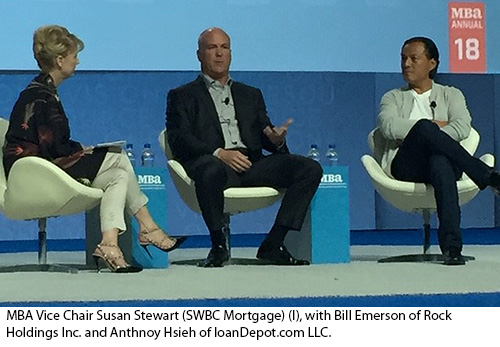
Bill Emerson and Anthony Hsieh on Fintech’s Future
WASHINGTON, D.C.–The mortgage industry’s adoption of financial technology will be more evolutionary than revolutionary, two mortgage technology leaders said here at the Mortgage Bankers Association’s Annual Convention & Expo.
“It will take time to materialize,” said Bill Emerson, MBA 2016 Chairman and Vice Chairman of Quicken Loans and Rock Holdings, Detroit. “There is a ton of technology and tools that allow you to do what you want to do without having to physically walk through your home, but a lot of people want to do just that.”
 Emerson said consumers have choices about how they want to interact with their lender. “Most loan officers use technology and take a lot of apps on the phone,” he said. “They are not necessarily sitting in people’s homes taking applications. The reality is there is still someone that consumers can interact with who is a licensed professional if they want to.”
Emerson said consumers have choices about how they want to interact with their lender. “Most loan officers use technology and take a lot of apps on the phone,” he said. “They are not necessarily sitting in people’s homes taking applications. The reality is there is still someone that consumers can interact with who is a licensed professional if they want to.”
Anthony Hsieh, Founder and CEO of non-bank lender loanDepot.com and Founder of mellohome, a tech firm that connects pre-approved customers with a network of real estate agents, compared mortgage industry fintech innovation to going to a buffet. “Make sure you don’t take on too much or you’ll get a stomach ache,” he said. “It’s a cultural and also a strategic investment over time. It’s not a light switch; it’s a journey. Some technologies won’t work and you need to be OK with that.”
Hsieh noted firms such as Amazon and Netflix shape consumer behavior every day. “No one is smart enough to build technology that a consumer doesn’t want to use, so you have to watch what the consumer wants,” he said. “You need to build the technology, have a good foundation, wait and see what the consumer is looking for, then react to how consumers react.”
Emerson said the mortgage industry is starting to understand how important technology is. “The industry has lagged behind [other sectors] for a long time,” he said. “We’ve been in the data business for a long time, and we’re still a paper-intensive industry. But I do see things like artificial intelligence coming into play. And people talk about social media. At the end of the day, many consumers are still typing most of the time. But I think voice will start affecting the industry more and more. In the next five years you will start seeing voice playing a much bigger role than it plays today.”
The final decision about investing in financial technology remains a company-by-company choice, Emerson said. “Do you have the capital and will you invest it? Do you see it as an investment or as an expense?,” he said. He cautioned if a firm seeks to innovate today, it must ensure the product fits into the secondary market. “Whatever you’re developing has to be OK with the agencies, so if you’re trying to innovate you need to work with the agencies,” he said. “Know that you’re probably going to have to give that stuff away because you don’t really have a choice. Most limitations [on new fintech] come down to two things: do you want to innovate and how will it interact with the secondary market.”
Hsieh observed the real estate industry was built on franchise model and has changed very little in the past 10 years, noting people buy cars all the time and trade in their existing cars at the same time they buy a new one, “but that model is not available in our industry,” he said.
In the end, the consumer will set the pace of fintech adoption by making the decision, Hsieh said. “Is a human loan officer required for the consumer to be comfortable? I don’t know,” he said. “I think you just need to watch what the customer wants. There is no doubt a certain percentage of the population that is savvy enough to self serve if there is enough simplicity in the process. I don’t think we are quite there yet, but there is a percentage of human beings that will want to do that. Buying a home is very personal. So blending the two [fintech and traditional methods] is probably the right strategy.”
